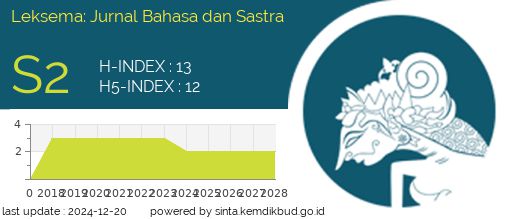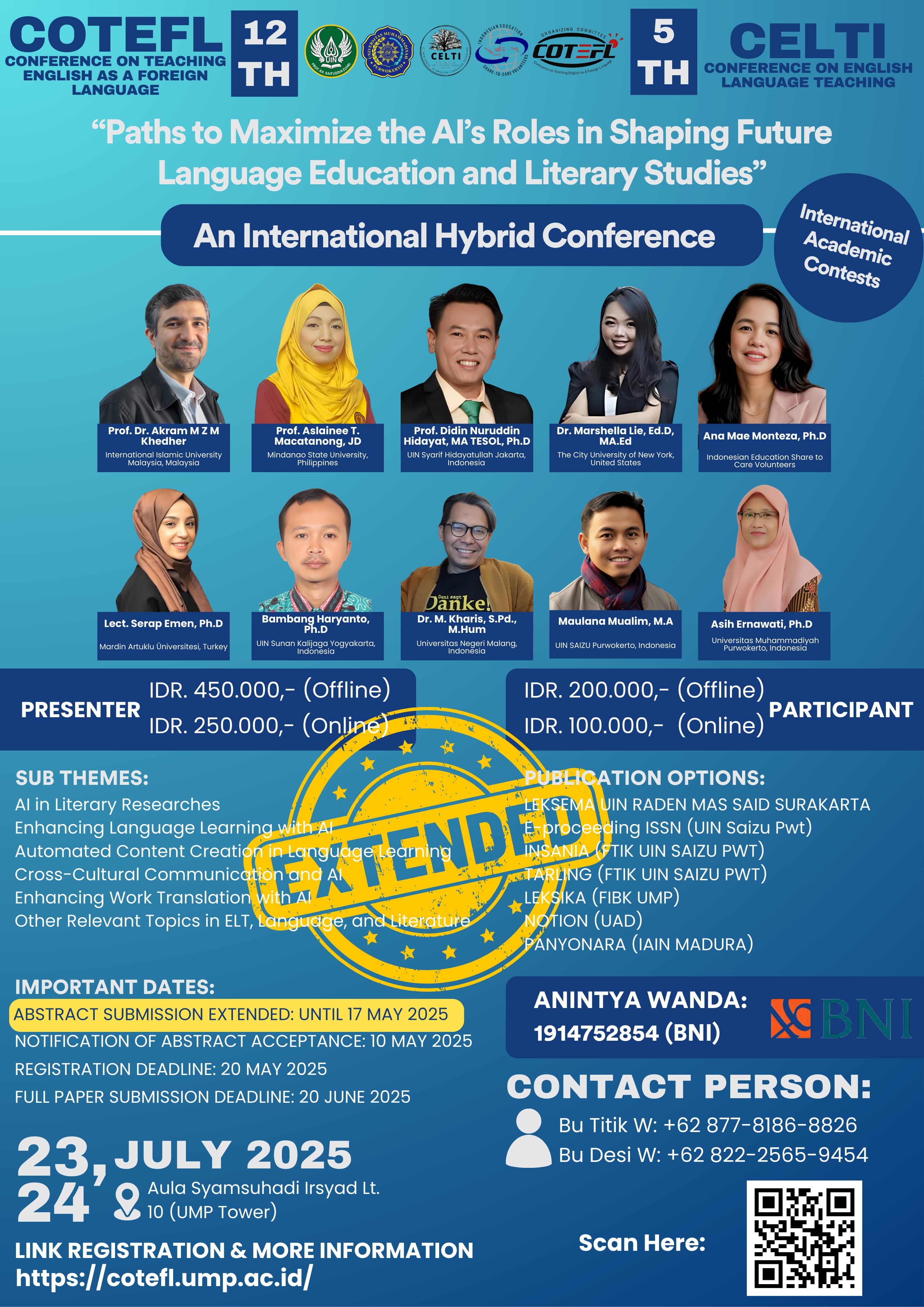JAVANESE IMPERATIVE SENTENCES IN THE DIALOGS OF 'ORA ATOS KAYA WATU' RADIO PLAY (KALIMAT IMPERATIF BAHASA JAWA DALAM DIALOG SANDIWARA RADIO 'ORA ATOS KAYA WATU')
DOI:
https://doi.org/10.22515/ljbs.v4i2.1724Keywords:
imperative sentences, radio drama, JavaneseAbstract
This research was aimed at describing the forms of Javanese imperative sentences of radio drama Ora Atos Kaya Watu (Not as Hard as a Stone) broadcasted by RRI Surakarta. The descriptions were based on the markers of each imperative sentence. As a type of descriptive-qualitative research, the data of this research were in the forms of morphemes, words, phrase, clauses, sentences gained from the the dialogues manuscripts of the drama. The data were collected by reading and note-taking which were then analyzed by using descrptive method. The result showed that the imperative sentences in the drama had two characteristics i.e.: ended with suffix -en, -a, -ana, or -na on their predicates and started with commands such as: ayo, sumonggo, and coba. Aside from that, there were two purposes intended by the imperative sentences as well, namely commanding for and forbidding from doing something. There were also found 9 types of meanings of the imperative sentences, i.e.: insisting, persuasions, suggestions, pleasing, prohibitions, commands, requests, asking, and recommendations.Downloads
References
Alwi, H. dkk. 2003. Tata Bahasa Baku Indonesia. Jakarta: Balai Pustaka
Arikunto, Suharsimi. 2010. Prosedur Penelitian: Suatu Pendekatan Praktik. Jakarta: PT Rineka Cipta
Djoko Lodang (Mingguan Basa Jawa ). 2006.18 Februari, 38
Herawati. 1990. Kalimat Imperatif dalam Bahasa Jawa (Laporan Penelitian)
Herawati, dkk. 2004. Kalimat dalam Bahasa Jawa: Penyusunan dan Permasalahannya. Yogyakarta: Proyek Pembinaan Bahasa dan Sastra Indonesia dan Daerah
Kridalaksana, Harimuri, dkk. 2008. Tata Bahasa Deskriptif Bahasa Indonesia: Sintaksis. Jakarta: Pusat Pembinaan dan Pengembangan Bahasa
Mahsun. 2005. Metode Penelitian Bahasa. Yogyakarta: Duta Wacana University Press
Moleong, Lexy J. 2004. Metodologi Penelitian Kualitatif. Jakarta: PT Remaja Rodaskarya
Mulawarman. 1998. Kalimat Imperatif dalam Bahasa Kutai (Kajian Wujudal dan Pragmatik) (Tesis)
Nababan, PWJ. 1987. Pragmatik: Teori dan Penerapannya. Jakarta: Depdikbud
Nurhayati, Endang & Siti Mulyani. 2006. Linguistik Bahasa Jawa: Kajian Fonologi, Morfologi, Sintaksis dan Semantik. Yogyakarta: Bagaskara.
Parera JD. 2009. Dasar-dasar Analisis Sintaksis. Jakarta: Erlangga
Ramlan. 1981. Sintkasis. Yogyakarta : C.V Karyono
Sasangka, Sri Satriya Tjatut Wisnu. 2001. Paramasastra Gagrag Anyar Bahasa Jawa. Jakarta: Yayasan Paramalingua
Soeparno. 2002. Dasar-dasar Linguistik Umum. Yogyakarta: Tiara Wacana
Sudaryanto. 1988. Metode Linguistik Bagian Kedua dan Aneka Teknik Pengumpulan Data. Yogyakarta: MI.I Komisariat UGM
Sudaryanto. 1991. Tata Bahasa Baku Bahasa Jawa. Yogyakarta: Duta Wacana University Press
Suhardi. 2008. Sintaksis. Yogyakarta: UNY Press
Tarigan, Henry G. 1985. Pengajaran Sintaksis. Bandung: Angkasa
Tarigan, Henry G. 1988. Pengajaran Tata Bahasa Tagmemik. Jakarta: Depdikbud
Trianti, Agus. 2011. Analisis Struktur Kalimat pada Rubrik Pengalamanku Majalah Djaka Lodang (Skripsi). Yogyakarta: FBS UNY
Setyadi. 1990. Kalimat Imperatif Bahasa Jawa (Tesis)
Downloads
Published
Issue
Section
License
The copyright of the received article shall be assigned to the publisher of the journal. The intended copyright includes the right to publish the article in various forms (including reprints). The journal maintains the publishing rights to published articles.
In line with the license, the authors and users (readers or other researchers) are allowed to share and adapt the material only for non-commercial purposes. In addition, the material must be given appropriate credit, provided with a link to the license, and indicated if changes were made. If authors remix, transform or build upon the material, authors must distribute their contributions under the same license as the original.






